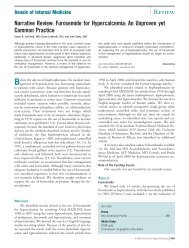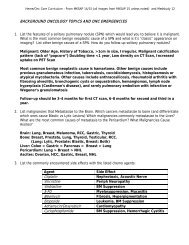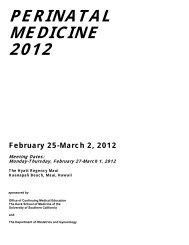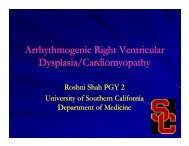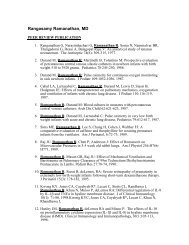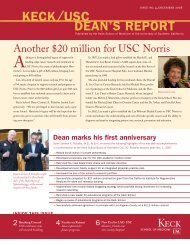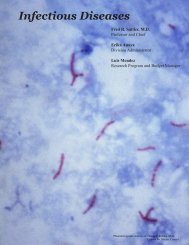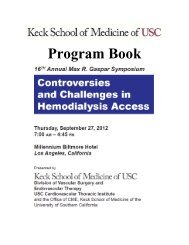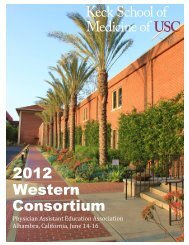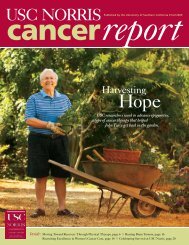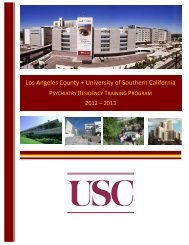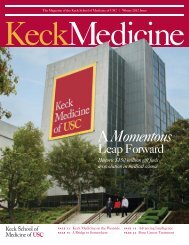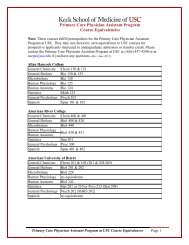Focus on Urban Health - Keck School of Medicine of USC ...
Focus on Urban Health - Keck School of Medicine of USC ...
Focus on Urban Health - Keck School of Medicine of USC ...
You also want an ePaper? Increase the reach of your titles
YUMPU automatically turns print PDFs into web optimized ePapers that Google loves.
S T U D E N T P R O F I L E•Learning Patient Care – While Being One By J<strong>on</strong> Nalick<strong>Keck</strong> medical studentJosh Lilienstein bringshis own experience as acancer survivor to hiswork with patients.24 KECK MEDICINE | Winter 2011 IssueI f d o c t o r s m a k e t h e w o r s t p at i e n t s ,<strong>Keck</strong> <strong>School</strong> <strong>of</strong> <strong>Medicine</strong> student Joshua Liliensteinbelieves the c<strong>on</strong>verse may also be true − that patientsmake the best doctors.The 31-year-old Los Angeles resident says that beingable to experience medical care from a patient’sperspective viscerally underscores the importance <strong>of</strong>compassi<strong>on</strong> and empathy.“Being a patient for a l<strong>on</strong>g time certainly helpedme understand that”in a way that no classor textbook ever could,he says.And he shouldknow: Lilienstein wasdiagnosed in 2006 withan aggressive form <strong>of</strong>testicular cancer thatprompted gruelingrounds <strong>of</strong> chemotherapy,multiple surgeriesand hospitalizati<strong>on</strong>s,derailed his studiesand nearly took his life.During the years hefought the disease, herepeatedly faced frustrati<strong>on</strong>sas a patient that informed his understanding<strong>of</strong> how to become a better doctor. Am<strong>on</strong>g these wasthe difficulty in managing the complexity <strong>of</strong> his owncare, which he received from multiple physicians andcancer centers over an extended period <strong>of</strong> time.“As a result <strong>of</strong> my care being so fragmented, at anumber <strong>of</strong> junctures, critical pieces <strong>of</strong> informati<strong>on</strong>slipped through the cracks, leading to dangerous andsometimes life-threatening situati<strong>on</strong>s. Since n<strong>on</strong>e <strong>of</strong>my medical records could be transmitted electr<strong>on</strong>ically,I had to c<strong>on</strong>stantly be aware <strong>of</strong> keeping it all− huge stacks <strong>of</strong> paper and dozens <strong>of</strong> compact disksc<strong>on</strong>taining imaging files − together and up to date, allwhile being so sick that I could <strong>of</strong>ten hardly get out<strong>of</strong> bed,” he says.He notes that while his doctors did their best tostay <strong>on</strong> top <strong>of</strong> his complex illness, “it <strong>of</strong>ten fell to myfamily and me to make sure that nothing fell throughthe cracks. I really learned about the importance <strong>of</strong>good communicati<strong>on</strong> between physicians. In a worldwhere patients are mobile and the practice <strong>of</strong> medicineincreasingly depends <strong>on</strong> specialists, we as physicianshave to get exp<strong>on</strong>entially better at communicatingwith each other and with our patients.”Lilienstein adds that his experience has made hima str<strong>on</strong>g prop<strong>on</strong>ent <strong>of</strong> creating a nati<strong>on</strong>al electr<strong>on</strong>icmedical record, “which has the potential to drasticallydecrease the amount <strong>of</strong> redundant tests performedand help ensure that critical informati<strong>on</strong> doesn’t getlost in the shuffle.”Lilienstein says that being a patient for so l<strong>on</strong>g c<strong>on</strong>ferssignificant advantages, as well as disadvantages.For example, he says, “I’ve been able to use myexperience to encourage patients to advocate forthemselves in ways that they didn’t know were possible,and I have been able to alert doctors to issuesthat they didn’t know were important.”On the downside though, Lilienstein sometimesstruggles to maintain the emoti<strong>on</strong>al distance physiciansneed to treat their patients.“One <strong>of</strong> our jobs as doctors is to take our pers<strong>on</strong>allives out <strong>of</strong> the equati<strong>on</strong> and focus <strong>on</strong> what [the patients]need. But there are times when I have difficultmoments and kind <strong>of</strong> flash back to my ownsituati<strong>on</strong>,” which can make delivering objectiveinformati<strong>on</strong> about patients’ medical opti<strong>on</strong>s moredifficult, he says.Lilienstein, now performing his internal medicinerotati<strong>on</strong> in his third year <strong>of</strong> medical school, has beencancer-free for more than a year.Looking back <strong>on</strong> his time as a patient, he describeshis experience as “an absolute curse, but strangelyand perversely enough, kind <strong>of</strong> a blessing.” Bey<strong>on</strong>dthat, he adds, “It has certainly made my life moreinteresting and has left me even more dedicated tobecoming a great doctor.” •Photo by Philip Channing



